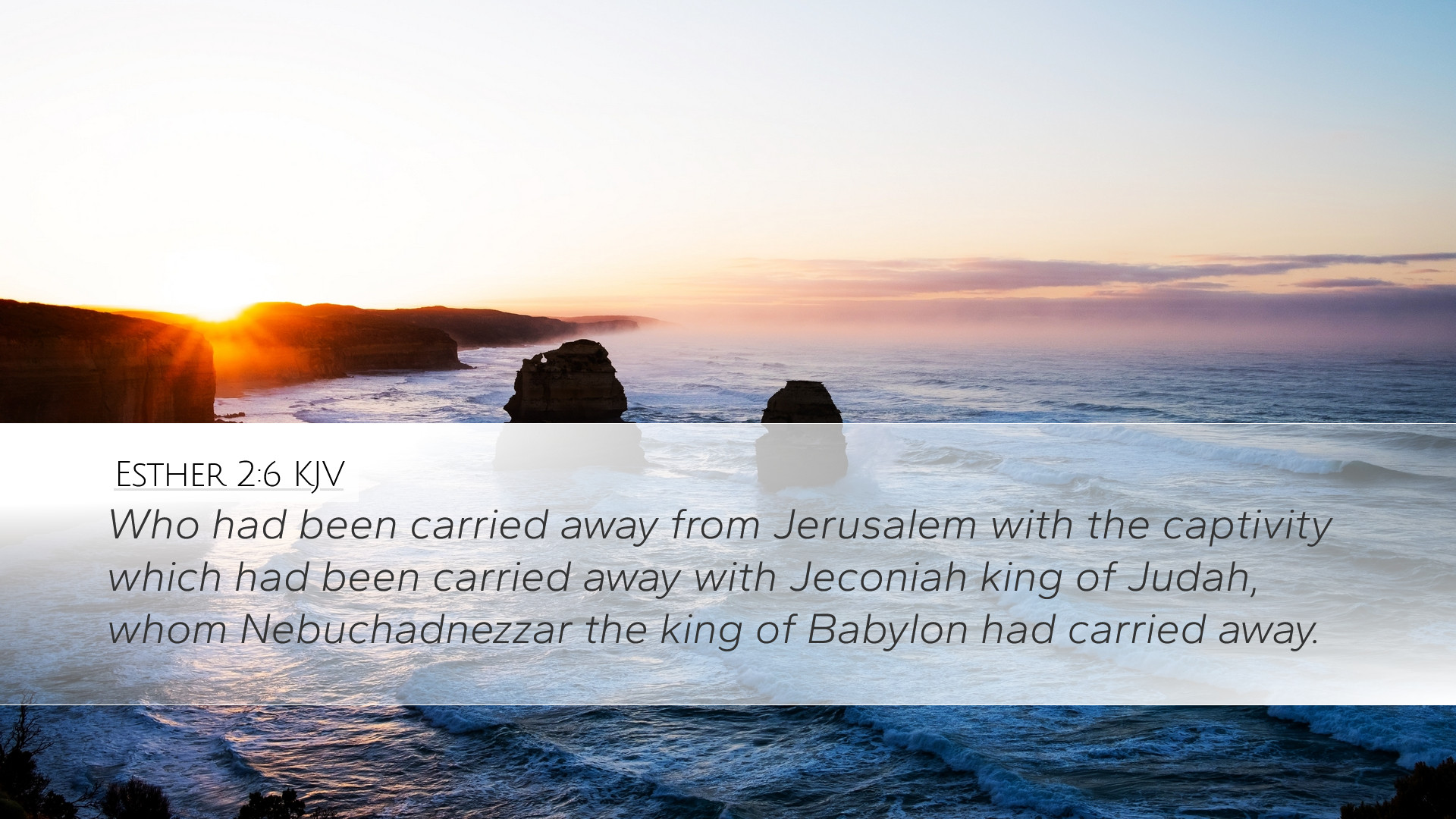Old Testament
Genesis Exodus Leviticus Numbers Deuteronomy Joshua Judges Ruth 1 Samuel 2 Samuel 1 Kings 2 Kings 1 Chronicles 2 Chronicles Ezra Nehemiah Esther Job Psalms Proverbs Ecclesiastes Song of Solomon Isaiah Jeremiah Lamentations Ezekiel Daniel Hosea Joel Amos Obadiah Jonah Micah Nahum Habakkuk Zephaniah Haggai Zechariah MalachiEsther 2:6
Esther 2:6 KJV
Who had been carried away from Jerusalem with the captivity which had been carried away with Jeconiah king of Judah, whom Nebuchadnezzar the king of Babylon had carried away.
Esther 2:6 Bible Commentary
Commentary on Esther 2:6
Verse Overview: Esther 2:6 states, “Who was carried away from Jerusalem with the captives which had been carried away with Jeconiah king of Judah, whom Nebuchadnezzar the king of Babylon had carried away.” This verse serves as an introduction to Esther's heritage and the circumstances that led to her being in captivity.
Historical Context
The mention of Jeconiah (also known as Jehoiachin) is significant in understanding the exile of the Jewish people to Babylon. Jeconiah was king during a tumultuous time, and his capture by Nebuchadnezzar marks a pivotal moment in Jewish history. The exile is not merely a backdrop but influences all subsequent events throughout the book of Esther. Understanding this context helps us appreciate God's sovereign plan in the life of Esther.
Theological Insights
God's Sovereignty: In the turmoil of captivity, it's essential to recognize that God’s hand is at work. Matthew Henry notes that, “The providential ordering of Esther's circumstances shows that God is in control over both nations and individuals.” This verse is a reminder that even in periods of great distress, God orchestrates events for His purpose.
Divine Preparation: Albert Barnes comments on how Esther’s origins highlight her as “a vessel of God’s choosing.” He emphasizes that Esther’s humble beginnings prepare her for a significant role in Israel’s deliverance. This prepares the reader for the unfolding narrative of deliverance which will come through her actions in the Persian court.
Character Analysis
Esther's Heritage: Understanding Esther's Jewish roots lends crucial insight into her identity. Adam Clarke elaborates on this, noting that her being among those exiled from Jerusalem establishes her as part of a lineage that holds great significance for the Jewish faith and community. The identity of being a Jew in a foreign land becomes a central issue, influencing her decisions and actions later in the narrative.
Lessons for Believers
This verse can teach modern believers several important lessons:
- God’s Faithfulness: The reference to the captives indicates that God did not abandon His people, even in exile. It signifies hope for restoration and reminds believers of God's faithfulness throughout generations.
- Importance of Heritage: The acknowledgment of Esther's Jewish lineage serves as a reminder for believers today to value their spiritual heritage and the legacy of faith that precedes them.
- God’s Preparation: Like Esther, individuals may find themselves in circumstances that seem ordinary or challenging, yet God is often preparing them for greater purposes. Every experience contributes to the divine tapestry.
Conclusion
Esther 2:6 is more than just a historical verse; it offers profound insights into the nature of God's governance and His incredible ability to use individuals in fulfilling His divine purposes. The significance of heritage, the faithfulness of God during trials, and the assurance that He is at work behind the scenes are all critical themes to reflect on as one contemplates this passage.
Final Reflections
As you delve deeper into this verse, consider how it resonates with your own life and circumstances. God’s orchestration of events through Esther's life challenges us to see beyond the immediate and to trust in His sovereignty. The context of captivity does not limit God's reach; rather, it opens an avenue for His purposes to be revealed, shaping the future of His people.


